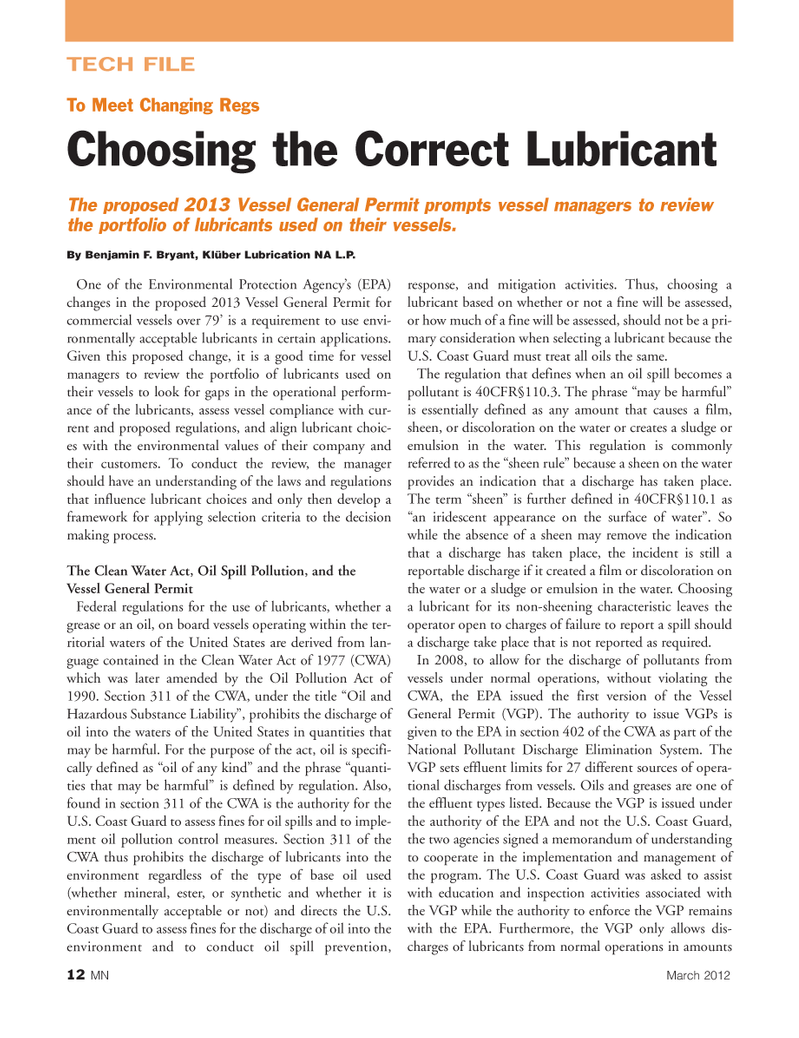
Page 12: of Marine News Magazine (March 2012)
Training & Education
Read this page in Pdf, Flash or Html5 edition of March 2012 Marine News Magazine
12MNMarch 2012 TECH FILEOne of the Environmental Protection Agency?s (EPA) changes in the proposed 2013 Vessel General Permit for commercial vessels over 79? is a requirement to use envi- ronmentally acceptable lubricants in certain applications. Given this proposed change, it is a good time for vessel managers to review the portfolio of lubricants used on their vessels to look for gaps in the operational perform- ance of the lubricants, assess vessel compliance with cur- rent and proposed regulations, and align lubricant choic- es with the environmental values of their company and their customers. To conduct the review, the manager should have an understanding of the laws and regulations that influence lubricant choices and only then develop a framework for applying selection criteria to the decision making process. The Clean Water Act, Oil Spill Pollution, and the Vessel General Permit Federal regulations for the use of lubricants, whether a grease or an oil, on board vessels operating within the ter- ritorial waters of the United States are derived from lan- guage contained in the Clean Water Act of 1977 (CWA) which was later amended by the Oil Pollution Act of 1990. Section 311 of the CWA, under the title ?Oil and Hazardous Substance Liability?, prohibits the discharge of oil into the waters of the United States in quantities that may be harmful. For the purpose of the act, oil is specifi- cally defined as ?oil of any kind? and the phrase ?quanti- ties that may be harmful? is defined by regulation. Also, found in section 311 of the CWA is the authority for the U.S. Coast Guard to assess fines for oil spills and to imple- ment oil pollution control measures. Section 311 of the CWA thus prohibits the discharge of lubricants into the environment regardless of the type of base oil used (whether mineral, ester, or synthetic and whether it is environmentally acceptable or not) and directs the U.S. Coast Guard to assess fines for the discharge of oil into the environment and to conduct oil spill prevention, response, and mitigation activities. Thus, choosing a lubricant based on whether or not a fine will be assessed,or how much of a fine will be assessed, should not be a pri- mary consideration when selecting a lubricant because the U.S. Coast Guard must treat all oils the same. The regulation that defines when an oil spill becomes a pollutant is 40CFR§110.3. The phrase ?may be harmful? is essentially defined as any amount that causes a film,sheen, or discoloration on the water or creates a sludge or emulsion in the water. This regulation is commonly referred to as the ?sheen rule? because a sheen on the water provides an indication that a discharge has taken place. The term ?sheen? is further defined in 40CFR§110.1 as ?an iridescent appearance on the surface of water?. So while the absence of a sheen may remove the indication that a discharge has taken place, the incident is still areportable discharge if it created a film or discoloration on the water or a sludge or emulsion in the water. Choosing a lubricant for its non-sheening characteristic leaves the operator open to charges of failure to report a spill should a discharge take place that is not reported as required. In 2008, to allow for the discharge of pollutants from vessels under normal operations, without violating the CWA, the EPA issued the first version of the Vessel General Permit (VGP). The authority to issue VGPs is given to the EPA in section 402 of the CWA as part of the National Pollutant Discharge Elimination System. The VGP sets effluent limits for 27 different sources of opera- tional discharges from vessels. Oils and greases are one of the effluent types listed. Because the VGP is issued under the authority of the EPA and not the U.S. Coast Guard, the two agencies signed a memorandum of understandingto cooperate in the implementation and management ofthe program. The U.S. Coast Guard was asked to assist with education and inspection activities associated withthe VGP while the authority to enforce the VGP remains with the EPA. Furthermore, the VGP only allows dis- charges of lubricants from normal operations in amounts To Meet Changing Regs Choosing the Correct Lubricant The proposed 2013 Vessel General Permit prompts vessel managers to reviewthe portfolio of lubricants used on their vessels.By Benjamin F. Bryant, Klüber Lubrication NA L.P. MN#3 (1-17):MN 2011 Layouts 3/2/2012 10:51 AM Page 12

 11
11

 13
13
